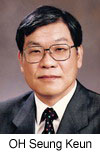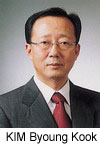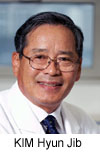Leaving SNU - Interview with Retiring Professors (1)
Prof. OH Seung Keun (Dept. of General Surgery)
 "Being a doctor means having to go through good times and bad," starts Professor OH Seung Keun (Surgery). "I'm glad to make a clean finish."
"Being a doctor means having to go through good times and bad," starts Professor OH Seung Keun (Surgery). "I'm glad to make a clean finish."
Oh is a leading authority on thyroid cancer surgery in Korea. He researched the then unexplored field of endocrine surgery related to the thyroid and adrenal gland at the University of Pennsylvania and was among the first doctors to play a role in establishing the Department of Breast and Endocrine Surgery in Korea in the 1980s when all surgeries were performed by the general surgery department. He was attracted to studying surgery, he says, by its"dramatic and tangible results."
Also being interested in computers, since 1995 Professor Oh has been distributing his personally developed medical education program to the general public."I realized during the course of my studies in the States that education through the Web is effective."
Oh also shared the most memorable episode in his life. In 1987, he had the experience of treating Virgilio Barco Vargas, the ex-president of Colombia."Right after landing in Korea, ex-President Barco fell ill with peritonitis and underwent an operation at SNU Hospital," he said."I received a medal and a Colombian knighthood for performing that operation. I was glad and proud to see ex-President Barco return home safely."
After retirement Professor Oh expressed his wishes to serve the community by launching a scholarship program for underprivileged students.
Prof. KIM Byoung Kook (Dept. of Internal Medicine)
 Professor KIM Byoung Kook (Internal Medicine) was the first to introduce bone marrow transplantation to Korea and lay the foundations of hematology. He was also the first to find the existence of the rare HTLV-1 virus (Human T-lymphotropic virus 1) in Korea, which causes leukemia and lymph cancer.
Professor KIM Byoung Kook (Internal Medicine) was the first to introduce bone marrow transplantation to Korea and lay the foundations of hematology. He was also the first to find the existence of the rare HTLV-1 virus (Human T-lymphotropic virus 1) in Korea, which causes leukemia and lymph cancer.
In the late 1970s, Kim studied abroad at the University of Washington Fred Hutchinson Cancer Research Center, the world's best marrow transplant institution. At that point in time, an actual marrow transplant had yet to be performed on a patient in Korea. Kim said,"Those were the days when our country's medical services were so poor that we had to beg other countries to teach us their medical practices." Kim recalls selling his house and working part-time as a researcher to continue studying in the States.
After retirement Professor Kim plans to continue his medical volunteer work. Having held the posts of SNUH medical social work manager and president of the Donations for Underprivileged Patients Organization, Professor Kim wishes to share the knowledge he has obtained through years of experience as a doctor.
Prof. KIM Hyun Jib (Dept. of Neurosurgery)
 Professor KIM Hyun Jib (Neurosurgery), who began dreaming of becoming a doctor while watching the series Marcus Welby, confesses he"kind of feel[s] empty" upon retirement.
Professor KIM Hyun Jib (Neurosurgery), who began dreaming of becoming a doctor while watching the series Marcus Welby, confesses he"kind of feel[s] empty" upon retirement.
As a leading authority on spinal cord tumor surgery and neck disc regeneration, he also recently published an article in the renowned science journal European Spine Journal (ESJ). The study focused on how to surgically treat 'thoracic ossified ligamentum flavum', a symptom which often leads to waist-down paralysis.
The busy life of treating patients day after day didn't deter Kim from engaging with the community. KIM frequently raised his voice to address problems within Korea's medical community.
When the worst controversy in the history of modern Korean medicine was sparked in 2000, Professor Kim, as the president of the Korean Association of Medical Colleges, took on the role of a mediator. (The pharmacists and the doctors were at odds over a medical reform that would have forbidden doctors from selling drugs, leaving only pharmacists eligible to sell medications.)
Professor Kim said,"A good doctor should not only be dedicated to his patients but also be able to think critically about current issues."
He referred to the low medical insurance costs and uncertified medical practices in Korea as some of the problems that need to be addressed.
Professor Kim closed his remarks by advising his students"not to become a doctor only interested in earning money." and that"it is important to settle into and focus on a specific field in the practice of medicine."
Prof. KIM Joo Hyun (Dept. of Neurosurgery)
 Professor KIM Joo Hyun (Neurosurgery) is the first Korean thoracic and cardiovascular surgeon to specialize in the lungs and the esophagus.
Professor KIM Joo Hyun (Neurosurgery) is the first Korean thoracic and cardiovascular surgeon to specialize in the lungs and the esophagus.
In the mid-80s, Professor Kim studied advanced medical technology at Massachusetts General Hospital, an affiliate of Harvard Medical School. One of these cutting-edge technologies was 'pre-surgery mediastinoscopy', which enables the surgeon to determine whether cancer cells have spread to the lymph vessels without having to cut open the lung prior to operation.
"At a time when radiology was not yet developed in Korea, the general usage of 'pre-surgery mediastinoscopy' enabled doctors to make an accurate assessment of a patient’s condition."
Professor Kim counted when cured patients expressed their gratitude as his favorite moments as a doctor. To his students, he entreated,"Doctors should understand the concerns of patients and their families. This is as important as having the necessary skills to cure the patients."
Prof. CHANG Kee-Hyun (Dept. of Radiology)
 Professor CHANG Kee-Hyun (Radiology) started by saying,"I am happy to retire in one whole healthy body."
Professor CHANG Kee-Hyun (Radiology) started by saying,"I am happy to retire in one whole healthy body."
Professor Chang is the first SNU surgeon who studied the cerebral nerve. In the early 1980s, he worked at the Harvard Medical School affiliated Massachusetts General Hospital as a researcher and interacted with experts in the neuroimaging field. As a result, at a time when the Department of Neurosurgery dealt with both the diagnosis and treatment of neurotics, with the help of Professor Chang, SNUH became the first hospital in Korea to delegate neuroimaging to the Department of Radiology.
He fondly added,"I worked with the enthusiasm of a pioneer developing a new field of medicine. Now SNUH provides medical service of world-class caliber, and attracts medical scholars from all over the world."
Professor Chang also has a special interest in medical ethics."Medical ethics is actually the basis of all medical studies for it helps doctors decide which practice is more ethical in circumstances of dilemma."
Professor Chang served as the president of the Society of Medical Ethics Education, which he cofounded with several other practitioners and taught the class Medical Ethics himself at SNU in 2000.
Written by JANG Hyo Jeong, SNU English Editor, fatalbonds@snu.ac.kr ?
Reviewed by Eli Park Sorensen, SNU Professor of Liberal Studies, eps7257@snu.ac.kr
Proofread by Brett Johnson, SNU English Editor, morningcalm2@gmail.com

